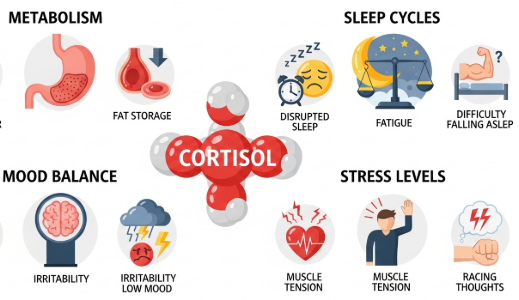Introduction: The Hormone Running Your Life (Quietly)
If you often feel tired, wired, overwhelmed, anxious, or unable to sleep, there’s a high chance that cortisol, your primary stress hormone, is playing a major role. Adults aged 25–45 are experiencing record-high stress levels due to career pressure, financial responsibilities, multitasking, and digital overload. Yet many don’t realize that stress isn’t just a feeling — it’s a biochemical event inside your body.
The hormone responsible?
👉 Cortisol.
Understanding cortisol is not just “nice to know.”
It affects your weight, sleep quality, mood, energy, skin, hormones, productivity, and even your immune system.
This article explains how cortisol works, how it gets out of balance, and how you can naturally restore harmony to your stress system.
1: What Exactly Is Cortisol?
Cortisol is a steroid hormone produced by the adrenal glands. It is essential for survival and helps regulate:
- energy production
- sleep-wake cycles
- inflammation
- blood sugar
- memory and focus
- metabolism
- stress response
Under healthy conditions, cortisol follows a daily rhythm:
- 🕗 High in the morning → wakes you up, energizes your body
- 🌙 Low at night → allows melatonin to rise so you can sleep
When stress becomes constant, this natural rhythm breaks — and that’s where problems begin.
2: How Stress Hijacks Cortisol
The Fight-or-Flight Reaction
Your body doesn’t distinguish between:
- a tiger chasing you
- a stressful work meeting
- a toxic relationship
- constant notifications
- financial worry
- long-term sleep deprivation
To your brain, stress is stress.
And every time you feel it, cortisol spikes.
3: Signs Your Cortisol Is Out of Balance
High or low cortisol causes very different symptoms. Here are the most common ones for ages 25–45.
Symptoms of High Cortisol
🔺 Constant fatigue but can’t relax
🔺 Anxiety, irritability
🔺 Weight gain (especially belly fat)
🔺 Food cravings (especially sugar & carbs)
🔺 High blood pressure
🔺 Digestive issues
🔺 Acne, dull skin
🔺 Trouble falling asleep
🔺 Fast heartbeat
🔺 Frequent headaches
🔺 Cold hands & feet
Symptoms of Low Cortisol (Burnout Stage)
After long-term stress, cortisol can drop too low.
🔻 Extreme fatigue
🔻 Brain fog
🔻 Low motivation
🔻 Weak immunity
🔻 Afternoon crash
🔻 Low blood pressure
🔻 Dizziness
🔻 Depression-like symptoms
Both states require lifestyle changes — not more pushing.
4: How Cortisol Affects Weight
1. Belly Fat & Slower Metabolism
Cortisol increases glucose in the bloodstream. If you’re not physically active, that glucose becomes fat storage, especially around the abdomen.
2. Stronger Cravings
Cortisol makes you crave energy-dense foods:
🍩 sugar
🍕 carbs
🍟 fried foods
This is why stressed people snack more, especially at night.
3. Muscle Breakdown
Chronically high cortisol can break down muscle mass, slowing metabolism even further.
5: How Cortisol Affects Sleep
Cortisol and melatonin function like a seesaw.
If cortisol is high at night → melatonin cannot rise → insomnia.
Signs include:
❌ tossing & turning
❌ waking at 3 AM
❌ waking unrefreshed
❌ needing caffeine to function
Sleep problems and stress feed each other, creating a cycle.
6: How Cortisol Affects Mental Health
1. Anxiety & Overthinking
High cortisol makes the brain hyper-alert — great for survival, bad for modern life.
2. Low Mood & Emotional Exhaustion
Long-term high stress can reduce serotonin and dopamine levels.
3. Brain Fog & Poor Concentration
Cortisol disrupts memory formation and focus.
4. Mood Swings
Cortisol affects other hormones like estrogen, testosterone, and thyroid hormones.
7: Daily Habits That Raise Cortisol
You may not realize you’re doing these:
- skipping breakfast
- drinking too much coffee
- doomscrolling
- sleeping late
- overtraining
- under-eating
- multitasking
- unresolved emotional stress
- toxic work environment
- dehydration
- lack of sunlight
- constant blue light exposure
- processed foods
- poor gut health
Modern life sets us up for cortisol imbalance.
8: How to Lower Cortisol Naturally
These are among the best evidence-based ways.
1. Morning Sunlight (5–10 minutes)
Resets your circadian rhythm.
2. Balanced Meals
Include protein + fiber + healthy fats.
3. Limit Caffeine
Avoid coffee before breakfast or after 2 PM.
4. Stress-Melting Breathing
Try: 4–7–8 breathing or box breathing.
5. Move Every Day
Short walks reduce cortisol immediately.
6. Reduce Blue Light at Night
Helps melatonin rise properly.
7. Sleep Before 11 PM
Your body repairs cortisol rhythm at night.
8. Heal Your Gut
Probiotics, fiber, whole foods.
9. Consider Natural Adaptogens
(General wellness info, not medical advice)
- Korean Red Ginseng
- Ashwagandha
- Rhodiola
- Holy Basil
- Magnesium
- Omega-3
Adaptogens help your body respond to stress more efficiently.
9: Why Korean Red Ginseng Helps Regulate Stress Hormones
General wellness explanation:
Korean Red Ginseng is widely known as a natural adaptogen that may:
- support balanced cortisol levels
- improve energy without overstimulation
- enhance focus & mental clarity
- support resilience to stress
- improve sleep quality
- reduce fatigue
- support immune function
It can be a helpful addition to a stress-reduction lifestyle.







